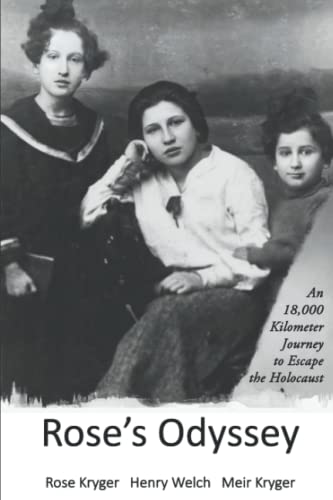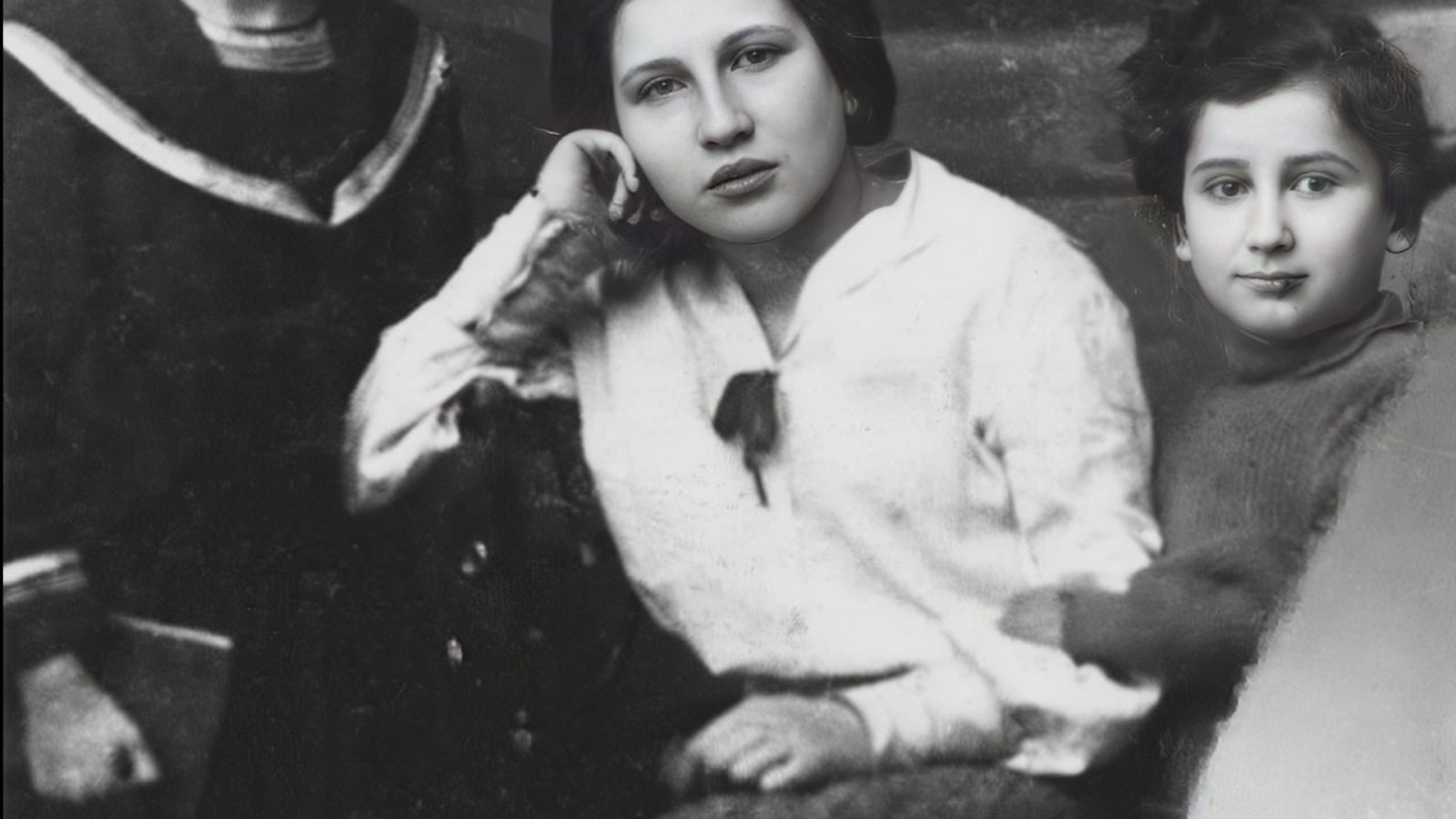The world is experiencing crisis after crisis and there are millions of refugees fleeing war, tyranny, and climate calamities. The memories of Rose’s Odyssey were locked away for 40 years. This is a true story of a family of refugees fleeing the Holocaust as told through the eyes of an adult (Rose) and a child (Zvi). It is an 18,000 kilometer journey that reminds us of what it is like to be a refugee and that the will to survive and be free is so strong.
Escape
It was November 28 when we left Lodz from the Warsaw train station. We took off our yellow armbands and the Star of David. We started out into the world without knowing exactly where we were going. We knew we had to go to the East. It did not matter how, as long as it was away from the Germans and in the direction of Bialystock. We took the train to Warsaw and arrived there in the middle of the night.
Everything was dark, cold, and sad. We hired a droshkys, a horse-driven coach, and asked the driver to take us to a place where there were Jews. The driver took us to a house at Sienna Street, 22, where he knew the porter. He woke the porter and asked him to take us to one of the Jewish families that lived in the building. I knocked at the door. A frightened voice answered, absolutely petrified to be awakened so late at night. I explained, begging in Yiddish, that we were two ladies with a small child and needed a place to stay overnight. We were afraid, and as Jews, no hotel would take us. These lovely people let us stay in their house overnight.
Worst Winter of Our Lives
We took a train from Turkestan and rode for almost a whole day, heading north. Finally, we got off at a small station, and from there, we continued on camelbacks for another 30 km.
We got on the camels with our luggage and proceeded to be shaken for the next 30 km. We arrived at our destination the next day. It was very windy and cold. We were assigned to a kibitka (mud hut) for nine people. It was one large room, with barely enough floor space for all of us to lie down. The mud floor was covered with straw. There was nothing else in that room. Everyone found a place to sleep on that straw-covered floor, but it was crowded, more than in a cowshed. . .
We were in the middle of the Kazakhistan Steppes, where the wind runs wild without any obstacles. Outside there were no trees and very scarce vegetation. The highest tree was a small bush not higher than 8 to 10 inches. That little bush dried by the wind became the only fuel we had to cook, bake and heat our kibitka. We collected these bushes and stored them in our hallway. . .
One day, a young man from our town showed up in our hut; he had nowhere to live, so we made room for him in our place. But, unfortunately, he brought us bad luck. Within a day or two, he got terribly sick, and our friend Ignatz took him to the little hospital in town. It turned out he had typhoid fever and infected all of us in the hut. A short time after, Ignatz got sick. We took him to the hospital in that little town. I remember I went along, and he had a very high fever and was singing all along the way, this Yiddish song.
“Wu zenen meine siben, gute, younge yorn — whatever happened to my seven, good, young years.”
He was hallucinating. A couple of days later he died.
Within a few days, everyone in our hut was infected and eventually got sick with typhoid fever. I was still on my feet. I cooked for all and took care of them. The winter was a frigid one. It snowed a little bit, but the cold wind would cut like a knife. The howling wind came blowing through the steppe and would go around and round our hut, producing a symphony of scary and chilling sounds. I kept the fire burning by putting another little dry bush into the stove. . .
That winter Zhyd Ken Chek turned out to be a death trap. Of the 128 people who had arrived at the end of December 1941, only about 25 survived by the time spring of 1942 made its slow appearance. The four of us were among the survivors.
One night there was a fire in the hut where all the single guys lived. Fires started easily. A spark from the stove, and all that dry straw on the floor was enough to light up the hut in flames. Most of the guys in that hut were already sick with typhoid fever, and a few were already dead. We helped to move the sick to the other huts. Unfortunately, most died that winter anyway from typhoid fever and hunger.
The people that died that winter had to be buried quickly, mostly in common graves, without a marker with their name. There was no one to say kaddish (prayer for the dead) after them. Because of the typhoid epidemic, the dead had to be buried quickly. They were buried in a hurry in a field close to the settlement. Maybe because of the cold winds during the winter, the graves were not dug deep enough, and too many bodies were placed into the same grave. When spring came, hands and legs were sticking out from the ground. Those unfortunate, nameless bodies had to be buried again in deeper and larger graves. . .
That ill-fated single men’s hut; out of 45 strong, young men, only two or three survived. The rest of them died during the typhoid epidemic. There was no medication, no medical assistance and not enough food. I would visit them from time to time and bring whatever food we had to spare.
The tiny hospital several miles away was overcrowded with the sick; the sick were everywhere. People were lying on the bare floor, in corridors, passageways, and even in the courtyard — without anyone to assist them. There was practically no hospital personnel or doctors to care for the sick. They just died lying there on the floor. The dead were gathered once a day and buried in common graves. These pitiful people simply disappeared without a name or sign, as if they never existed.
The war is over
The day they announced that the war was over, everybody went crazy. People danced on the streets embracing and kissing each other for happiness, yet somehow, we were afraid to believe it. It was too good to be true. The world was free again. These were the slogans, and everybody was applauding. Even little Marylka was clapping her hands and singing: ‘Paci, paci kichelech, ’ a Yiddish song for babies to clap their hands. For us and our daily life, nothing had changed. However, there was an exaltation in the air. We knew that very soon, the day would come that we would leave this place and go back to our home — to Lodz.
After the war was over, a few people did not wait for official permission to leave; they packed up their belongings and left illegally.
Finding family who survived. Rose hears Sally’s story.
“We were transported, without food, without water — just like cattle to the slaughter. We arrived in Auschwitz. I am sure that you have heard enough stories about that. The women were immediately separated from the men. They shaved my head.
“As you know, there were two lines. So far, I was lucky; I was sent to the line with the young women; we were all standing there naked, and I was there with my big protruding belly. The women in my line chased me away; they did not want a pregnant woman with them. A pregnant woman was an automatic death sentence. I felt dizzy. I knew that I would faint any minute. I sat on the ground and cried.
“From somewhere, a woman dressed in a white doctor’s coat materialized before me. She picked me up from the ground and said in Polish, ‘Come with me!’
“I followed her into a barrack that looked to be a hospital. She gave me some water and something to eat. Then she looked at my belly and said: “Do you want to live? If you do, they will take it away from you.”
“She was pointing with her head at my belly.
“I just looked at her with my mouth open without saying a word. I know that I shook my head to say — yes. Was I in shock? Did I know what I was doing? Did I have much of a choice?
“I was used for some medical experiments. They gave me many injections. They did . . . I am sorry, I do not want to. I cannot . . . I do not want to talk about it.” She stopped for a while, lowered her head, bit her lower lip, took a deep breath and slowly continued. “The woman was a Polish doctor assisting and helping the infamous Dr. Mengele; may his name be excluded from humanity. One experiment they did on me that I am certain of was to accelerate labor pains and cause premature birth. Mengele himself did that. I gave birth to a baby boy. I saw the baby as they took it away; to do some more experiments and a biopsy. The smoke from the chimneys was high, and I knew where my little baby would end. He came into the world with a big cry. I did not blame him. He wanted God to hear him, or maybe, he did not want to go up in smoke with the rest of them. “I am sorry, but I do not want to talk about it. I am sorry because I did not want to even think about it anymore. It is gone forever.”
At that point, she broke down and cried. It was a desperate cry, a cry that broke your heart. She half lowered her head while tears were running down her cheeks. I looked at her and admired her courage. She wiped her eyes with her hand. I handed her a handkerchief. She took it from me and started pulling it, tearing it, then wiped her eyes and slowly continued.
“This Polish lady doctor saved my life. She brought me something to wear and transferred me immediately to a regular barrack. On the third day after I gave birth, she made sure that I was transferred into a working barrack before they made the next selection. Otherwise, I would have been taken with all the rest of the sick women to the gas chambers and crematoriums.”



